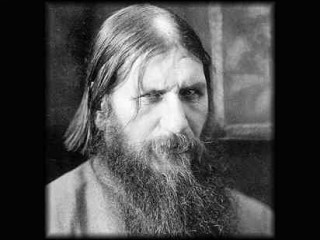
Rasputin biography
Date of birth : 1869-01-22
Date of death : 1916-12-29
Birthplace : Tyumen, Siberia, Russia
Nationality : Russian
Category : Historian personalities
Last modified : 2010-07-29
Credited as : Mystica , called strannik, healer and prophet
0 votes so far
It has been argued that Rasputin helped to discredit the tsarist government, leading to the fall of the Romanov dynasty, in 1917. Contemporary opinions saw Rasputin variously as a saintly mystic, visionary, healer and prophet or, on the contrary, as a debauched religious charlatan. There has been much uncertainty over Rasputin's life and influence as accounts of his life have often been based on dubious memoirs, hearsay and legend.
Although he attended school, the peasant Grigory Yefimovich Novykh remained illiterate, and his reputation for licentiousness earned him the surname Rasputin, Russian for “debauched one.” He evidently underwent a religious conversion at age 18, and eventually he went to the monastery at Verkhoture, where he was introduced to the Khlysty (Flagellants) sect. Rasputin perverted Khlysty beliefs into the doctrine that one was nearest God when feeling “holy passionlessness” and that the best way to reach such a state was through the sexual exhaustion that came after prolonged debauchery. Rasputin did not become a monk, returned to Pokrovskoye, and at age 19 married Proskovia Fyodorovna, who later bore him four children. Marriage did not settle Rasputin; he left home and wandered to Mount Athos, Greece, and Jerusalem, living off the peasants' donations and gaining a reputation as a starets (self-proclaimed holy man) with the ability to heal the sick and predict the future.
Rasputin's wanderings took him to St. Petersburg (1903), where he was welcomed by Theophan, inspector of the religious Academy of St. Petersburg, and Hermogen, bishop of Saratov. The court circles of St. Petersburg at that time were entertaining themselves by delving into mysticism and the occult, so Rasputin—a filthy, unkempt wanderer with brilliant eyes and allegedly extraordinary healing talents—was warmly welcomed. In 1905 Rasputin was introduced to the royal family, and in 1908 he was summoned to the palace of Nicholas and Alexandra during one of their hemophiliac son's bleeding episodes. Rasputin succeeded in easing the boy's suffering (probably by his hypnotic powers) and, upon leaving the palace, warned the parents that the destiny of both the child and the dynasty were irrevocably linked to him, thereby setting in motion a decade of Rasputin's powerful influence on the imperial family and affairs of state.
In the presence of the royal family, Rasputin consistently maintained the posture of a humble and holy peasant. Outside court, however, he soon fell into his former licentious habits. Preaching that physical contact with his own person had a purifying and healing effect, he acquired mistresses and attempted to seduce many other women. When accounts of Rasputin's conduct reached the ears of Nicholas, the tsar refused to believe that he was anything other than a holy man, and Rasputin's accusers found themselves transferred to remote regions of the empire or entirely removed from their positions of influence.
By 1911 Rasputin's behaviour had become a general scandal. The prime minister, P.A. Stolypin, sent the tsar a report on Rasputin's misdeeds. As a result, the tsar expelled Rasputin, but Alexandra had him returned within a matter of months. Nicholas, anxious not to displease his wife or endanger his son, upon whom Rasputin had an obviously beneficial effect, chose to ignore further allegations of wrongdoing.
Rasputin reached the pinnacle of his power at the Russian court after 1915. During World War I, Nicholas II took personal command of his forces (September 1915) and went to the troops on the front, leaving Alexandra in charge of Russia's internal affairs, while Rasputin served as her personal advisor. Rasputin's influence ranged from the appointment of church officials to the selection of cabinet ministers (often incompetent opportunists), and he occasionally intervened in military matters to Russia's detriment. Though supporting no particular political group, Rasputin was a strong opponent of anyone opposing the autocracy or himself.
Several attempts were made to take the life of Rasputin and save Russia from further calamity, but none were successful until 1916. Then a group of extreme conservatives, including Prince Feliks Yusupov (husband of the tsar's niece), Vladimir Mitrofanovich Purishkevich (a member of the Duma), and Grand Duke Dmitry Pavlovich (the tsar's cousin), formed a conspiracy to eliminate Rasputin and save the monarchy from further scandal. On the night of December 29–30 (December 16–17, Old Style), Rasputin was invited to visit Yusupov's home and, once there, was given poisoned wine and tea cakes. When he did not die, the frantic Yusupov shot him. Rasputin collapsed but was able to run out into the courtyard, where Purishkevich shot him again. The conspirators then bound him and threw him through a hole in the ice into the Neva River, where he finally died by drowning.
The murder merely strengthened Alexandra's resolve to uphold the principle of autocracy, but a few weeks later the whole imperial regime was swept away by revolution.
















